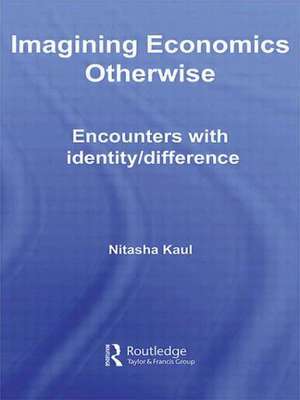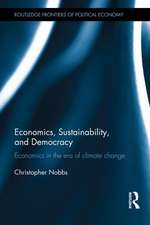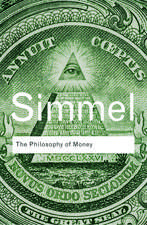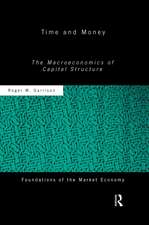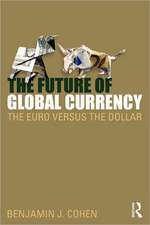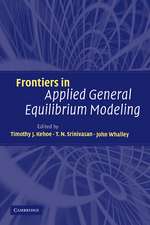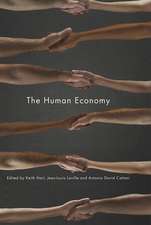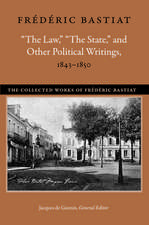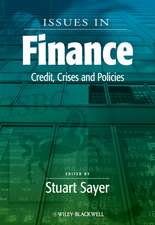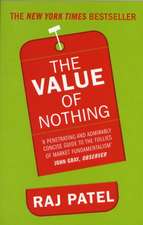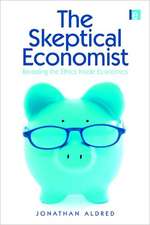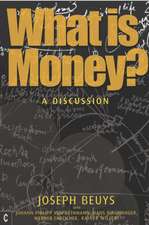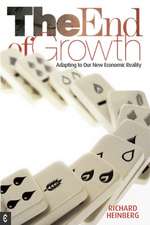Imagining Economics Otherwise: Encounters with Identity/Difference: Routledge Frontiers of Political Economy
Autor Nitasha Kaulen Limba Engleză Hardback – 4 oct 2007
Nitasha Kaul re-examines certain understood ways of thinking about economics as a discipline, especially in elation to questions of identity and difference. This book explores the notion that economics is not a timeless, universal, objective science but a changing response to the problems of knowledge and administration. The epistemological inheritance of economics is ‘rooted’ in the enlightenment, and it also inherits the liberal paradoxes of that age. Kaul argues that the juxtaposition of identity with economic (culture/economy) is essential, and can only be achieved by critiquing establishment economists’ discourse on identity, and taking feminist poststructural and postcolonial work seriously. The author challenges the assumption that there is a simple linkage between the category economic, the entity economy and the study of economics. She envisions an economics in the plural: contextual, social, political—econo-mixes.
The book brings together some of the most urgent topics of the day—the power of economics as a discipline, the questions of difference and the politics of identity, and feminist perspectives on this. It will be particularly relevant to heterodox economists, feminist theorists, postcolonial studies scholars, social and cultural theorists, philosophers and history of ideas or intellectual history of thought scholars.
| Toate formatele și edițiile | Preț | Express |
|---|---|---|
| Paperback (1) | 421.61 lei 43-57 zile | |
| Taylor & Francis – 17 apr 2010 | 421.61 lei 43-57 zile | |
| Hardback (1) | 1060.25 lei 43-57 zile | |
| Taylor & Francis – 4 oct 2007 | 1060.25 lei 43-57 zile |
Din seria Routledge Frontiers of Political Economy
-
 Preț: 309.90 lei
Preț: 309.90 lei -
 Preț: 309.79 lei
Preț: 309.79 lei -
 Preț: 316.03 lei
Preț: 316.03 lei -
 Preț: 310.55 lei
Preț: 310.55 lei - 9%
 Preț: 866.80 lei
Preț: 866.80 lei -
 Preț: 309.12 lei
Preț: 309.12 lei -
 Preț: 311.61 lei
Preț: 311.61 lei -
 Preț: 286.98 lei
Preț: 286.98 lei -
 Preț: 327.83 lei
Preț: 327.83 lei - 9%
 Preț: 1005.48 lei
Preț: 1005.48 lei -
 Preț: 386.11 lei
Preț: 386.11 lei - 9%
 Preț: 938.47 lei
Preț: 938.47 lei -
 Preț: 302.75 lei
Preț: 302.75 lei -
 Preț: 151.96 lei
Preț: 151.96 lei -
 Preț: 318.54 lei
Preț: 318.54 lei -
 Preț: 317.95 lei
Preț: 317.95 lei -
 Preț: 310.01 lei
Preț: 310.01 lei -
 Preț: 326.49 lei
Preț: 326.49 lei -
 Preț: 155.43 lei
Preț: 155.43 lei -
 Preț: 309.79 lei
Preț: 309.79 lei -
 Preț: 152.66 lei
Preț: 152.66 lei -
 Preț: 328.76 lei
Preț: 328.76 lei -
 Preț: 281.72 lei
Preț: 281.72 lei -
 Preț: 286.58 lei
Preț: 286.58 lei -
 Preț: 325.09 lei
Preț: 325.09 lei -
 Preț: 353.77 lei
Preț: 353.77 lei -
 Preț: 371.95 lei
Preț: 371.95 lei -
 Preț: 310.95 lei
Preț: 310.95 lei -
 Preț: 324.87 lei
Preț: 324.87 lei -
 Preț: 312.86 lei
Preț: 312.86 lei -
 Preț: 374.16 lei
Preț: 374.16 lei -
 Preț: 329.09 lei
Preț: 329.09 lei -
 Preț: 348.21 lei
Preț: 348.21 lei - 28%
 Preț: 1047.06 lei
Preț: 1047.06 lei - 18%
 Preț: 1169.45 lei
Preț: 1169.45 lei - 18%
 Preț: 1555.17 lei
Preț: 1555.17 lei - 18%
 Preț: 1048.43 lei
Preț: 1048.43 lei - 18%
 Preț: 1059.84 lei
Preț: 1059.84 lei - 31%
 Preț: 767.47 lei
Preț: 767.47 lei - 18%
 Preț: 731.92 lei
Preț: 731.92 lei - 26%
 Preț: 822.54 lei
Preț: 822.54 lei - 18%
 Preț: 1796.21 lei
Preț: 1796.21 lei - 26%
 Preț: 1184.91 lei
Preț: 1184.91 lei - 18%
 Preț: 1120.23 lei
Preț: 1120.23 lei - 15%
 Preț: 700.95 lei
Preț: 700.95 lei - 18%
 Preț: 1116.31 lei
Preț: 1116.31 lei - 22%
 Preț: 299.52 lei
Preț: 299.52 lei - 18%
 Preț: 999.46 lei
Preț: 999.46 lei
Preț: 1060.25 lei
Preț vechi: 1292.98 lei
-18% Nou
Puncte Express: 1590
Preț estimativ în valută:
202.87€ • 212.39$ • 167.87£
202.87€ • 212.39$ • 167.87£
Carte tipărită la comandă
Livrare economică 07-21 aprilie
Preluare comenzi: 021 569.72.76
Specificații
ISBN-13: 9780415383974
ISBN-10: 0415383978
Pagini: 304
Dimensiuni: 156 x 234 x 18 mm
Greutate: 0.61 kg
Ediția:New.
Editura: Taylor & Francis
Colecția Routledge
Seria Routledge Frontiers of Political Economy
Locul publicării:Oxford, United Kingdom
ISBN-10: 0415383978
Pagini: 304
Dimensiuni: 156 x 234 x 18 mm
Greutate: 0.61 kg
Ediția:New.
Editura: Taylor & Francis
Colecția Routledge
Seria Routledge Frontiers of Political Economy
Locul publicării:Oxford, United Kingdom
Public țintă
PostgraduateCuprins
Part 1: Looking Back Looking Ahead 1. Introduction 1.1 Introduction 1.2 The Writing of Theory in Economics 1.3 The Overview 1.4 Signpost Part 2: Rooting and Routing Economics 2. Enlightenment Epistemology and the Subject-World of Economics 2.1 Introduction 2.2 Enterprise of Economics 2.3 Enlightenment and Epistemology 2.4 Subject-World of Economics 2.5 The Theory and Science of Economics 2.6 Mathematical Formalism, Representation and the Moralisation of Objectivity 2.7 Conclusion Part 3: Issues of Knowledge and Difference 3. Modernist Rendition of Knowledge and the Question of Difference 3.1 Introduction 3.2 Time and the Other of Modernist Knowledge 3.3 Rousseau’s Discourse On Political Economy 3.4 Subjectivity of Modernist Knowledge and the Transcendental Pretence 3.5 Reason, History and the Hegelian Dialectic 3.6 Human Nature and the Question of Difference 3.7 The Postcolonial Moment in Epistemology 3.8 Conclusion Part 4: Juxtaposing Questions of Identity and the Economic 4. Identity Problematics 4.1 On Identity 4.2 Abstract Essentialist Individual Identity 4.3 Critiquing the Abstract Essentialist Individual View of Identity 4.4 The Orthodox and the Heterodox: A Possible Dialogue 4.5 Rethinking the Relation of Identity and Difference in Knowledge 4.6 The Politics of Identity 5. Economics and Identity 5.1 Expanding 'Economics Inc.' (Economics Incorporated)? 5.2 Illustration One: Akerlof and Kranton on 'Economics and Identity' 5.3 Illustration Two: Sen On 'Reason Before Identity' 6. Rethinking Identity Translationally and Reconsidering the Economic 6.1 Introduction 6.2 Concentric and Translational Architectures of Identity 6.3 Identity : Economic: Culture: Economy 6.4 Conclusion Part 5: In Conclusion 7. Writing Economic Theory Another Way 7.1 A Recap 7.2 Writing Economic Theory Another Way 7.3 Pedagogy Re-Visited: Contextual Social Political Economices 7.4 Conclusion: Penpoints On Mirrors
Notă biografică
Nitasha Kaul (www.nitashakaul.com) is an economist, novelist, theorist, poet. She has a joint doctorate in Economics and Philosophy and was previously a tenured Lecturer (Assistant Professor) in Economics department at the Bristol Business School. She is currently a Visiting Fellow at the Centre for the Study of Democracy, University of Westminster in London, and an Associate Professor in Creative Writing at the Royal Thimphu College in Bhutan. She speaks within and outside academia, and has published books, essays in edited volumes, journal articles, and newspaper comments on the diverse themes of identity, economics, critical social theory, democracy, technology, gender, civic governmentality, and politics of knowledge production. Her novel Residue was shortlisted for the Man Asian Literary Prize in 2009. Her next book is a scholarly monograph on the history, politics, and economy of Bhutan, the land of Gross National Happiness (GNH).
Descriere
The result of a multifaceted investigation into the nature of knowledge produced by economics, this book re-examines certain understood ways of thinking about economics as a discipline, especially in relation to questions of identity and difference.
